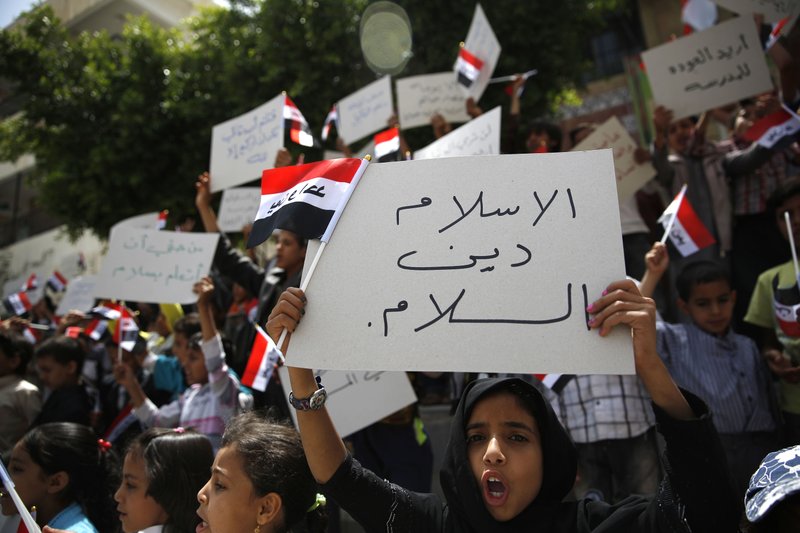RIYADH, Saudi Arabia -- Yemeni rebels fired a Scud missile into Saudi Arabia early Saturday in an escalation of a months-long war.
The attack suggests that despite more than two months of airstrikes by a Saudi-led coalition, Yemen's Shiite rebels, known as Houthis, still have the military firepower to threaten cities inside Saudi Arabia.
According to the official Saudi Press Agency, two missiles launched from a Patriot missile battery shot down the Scud before dawn near the southwestern city of Khamis Mushait. The agency did not report any casualties in the attack, the first use of a Cold War-era Scud by the rebels since Saudi-led airstrikes targeting the Houthis began in late March.
Yemen's state news agency SABA, now controlled by the Houthis, said the rebels fired the Scud. The Houthis are allied with military and security forces loyal to former Yemeni President Ali Abdullah Saleh.
Khamis Mushait is home to King Khalid Air Base, where Saudis on social media reported hearing air-raid sirens around the city during the attack.
The Yemeni military widely was believed to possess around 300 Scud missiles, most of which fell into the hands of the rebels. In April, the spokesman for the Saudi-led coalition, Saudi Brig. Gen. Ahmed Asiri, implied that the Scud arsenal in Yemen had been degraded as a result of the airstrikes.
"As coalition forces, we confirm that all Houthi capabilities were targeted, foremost their ballistic missiles," Asiri said at the time.
On Saturday, Asiri told the Saudi-owned Al-Hadath news channel that coalition forces have destroyed "most of" Yemen's Scuds.
Abdulkhaleq Abdullah, a professor of political science at United Arab Emirates University, said Saturday's attack was a way for the Houthis and their allies to signal they still have fight left despite months of airstrikes. The United Arab Emirates is a member of the Saudi-led coalition.
"It is an escalation," Abdullah said. "It is clear now there has not been a knockout and a complete demolition of Houthi firepower."
The Saudis and Western powers accuse the Houthis of receiving military support from Shiite power Iran as part of a larger proxy war between the Sunni kingdom and the Islamic Republic across the Mideast. Tehran and the rebels deny the allegations, though Iran has acknowledged sending humanitarian aid to the Houthis.
Saudi Arabia leads a coalition targeting the rebels in airstrikes in support of Yemen's exiled President Abed Rabbo Mansour Hadi. Those strikes have targeted arms caches and Scud missile sites around the country.
The coalition responded to Saturday's attack by targeting and damaging the Scud launcher, which was south of the Houthi stronghold city of Saada.
Yemeni security officials said coalition planes launched at least six airstrikes early Saturday against a Houthi convoy heading toward Saada. Airstrikes also hit a convoy in Amran province, which Houthi and tribal officials said was transporting livestock. The officials spoke on condition of anonymity because they were not authorized to talk to the media.
While the Saudi offensive has been waged by air, the Houthis typically have been attacking the long Saudi frontier with ground forces and artillery fire. The rebels' use of Scud missiles showed the insurgents still have access to sophisticated weapons despite hundreds of airstrikes targeting bases and weapons caches of the Houthis and their allies.
Saudi Arabia is the world's largest oil exporter. Its major oil fields are in the east of the country, far from Khamis Mushait.
The United States has provided logistical support to the mostly Arab coalition. U.S. military officials in the region had no comment.
The Houthis began their advance in September, sweeping down from the north and capturing the capital, Sanaa. They held top officials, including Hadi, under house arrest until Hadi fled, first to the southern port city of Aden, then to Saudi Arabia as the rebels closed in.
The Saudi-led air campaign and ground fighting have killed more than 1,000 civilians and displaced more than 1 million people since mid-March, Stephane Dujarric, spokesman for U.N. Secretary-General Ban Ki-moon, told reporters Wednesday.
The offensive, now in its third month, has so far failed to force the Houthis to withdraw from any territory they hold or blunt their advance in southern Yemen.
Security officials said fierce fighting on the ground continued Saturday in the areas of Abyan, Haja and Taiz, as coalition planes hit targets in Abyan, Amran and Saada.
Planned Yemeni peace talks were postponed last month just two days before they were to have begun May 28. In a statement Saturday, Ban announced that peace talks between the warring parties in Yemen will resume in Geneva on June 14.
Dujarric said Saturday that Ban hopes the meetings will restart "a peaceful, orderly, inclusive and Yemeni-led transition process."
The secretary-general also reiterated his call for another humanitarian pause to get aid to hundreds of thousands of Yemenis in need. Ban said this also could help create an atmosphere "that is more conducive for peaceful dialogue."
The Saudi-led coalition has imposed an air and sea embargo on Yemen, causing shortages of food, fuel and medical supplies. Only a few humanitarian shipments have been allowed through.
The Soviet Union developed Scuds during the Cold War and exported the ballistic missiles to several countries, including Yemen.
Scud strikes in Saudi Arabia have been fatal in the past. On Feb. 25, 1991, an Iraqi-fired Scud evaded a Patriot strike and hit a U.S. base in Dhahran, killing 28 American soldiers.
Information for this article was contributed by Abdullah al-Shihri, Adam Schreck, Ahmed al-Haj, Jon Gambrell and Maamoun Youssef of The Associated Press and by Zaid Al-Alayaa, Laura King and Amro Hassan of the Los Angeles Times.
A Section on 06/07/2015

